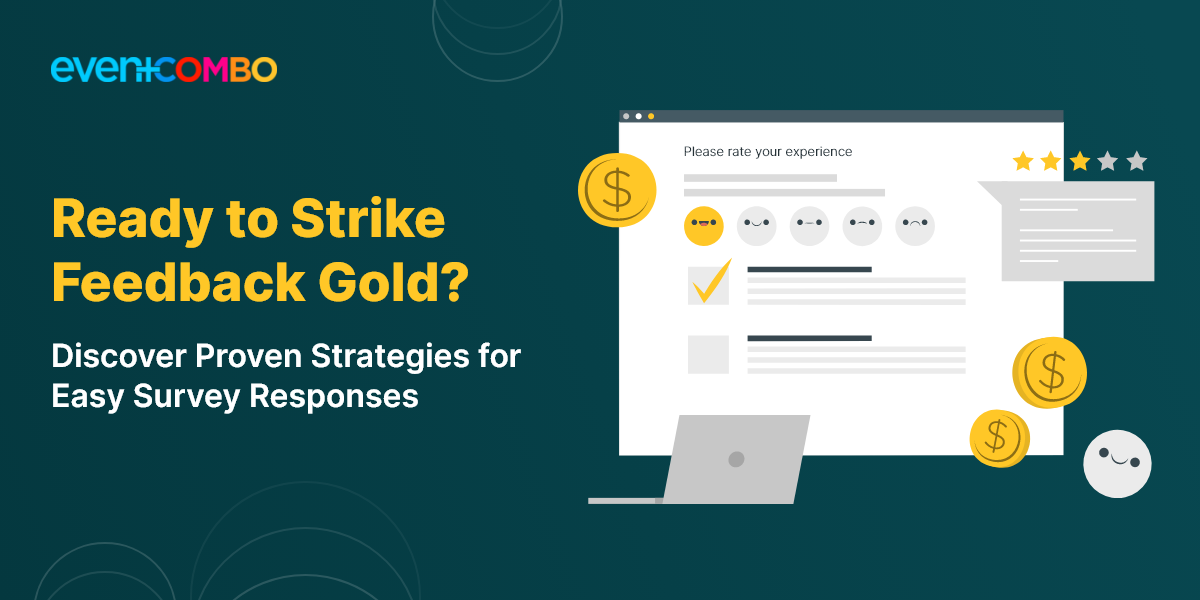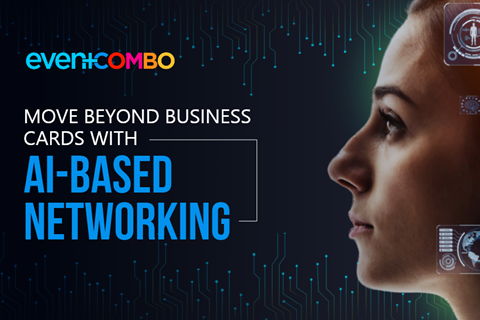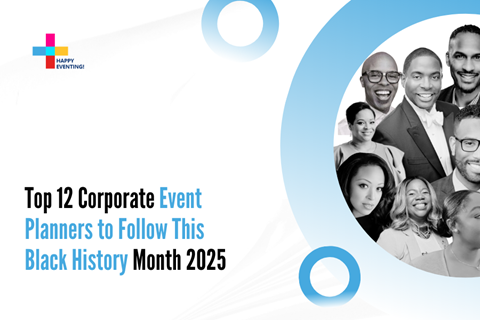Master Survey Incentive Strategy to Unlock Valuable Event Insights

Oct 25, 2023 Shruti Shah
Surveys are valuable tools used ubiquitously, whether in the form of website pop-ups, post-YouTube video inquiries, or checkout counter questionnaires. However, most of us tend to ignore them, much like passing a pebble on the street, a sentiment shared by around 70-80% of people. But for event planners, they are incredibly useful, for which they keep focusing on boosting response rates and gathering important data.
In a world where data-driven insights are crucial, leveraging survey incentive strategies wisely is the key to obtaining valuable feedback and improving services. If you are a part of the events industry, it's essential to understand the importance of using survey incentives effectively and selecting the right ones for your specific audience. In this guide, we'll explore practical strategies for using survey incentives that can make your event planning and technology services even better.
The Significance of Event Survey Incentives
Before we delve into the nitty-gritty of using survey incentives effectively, let's establish the significance of these incentives. Event surveys are only valuable when they generate a high response rate and provide honest, constructive feedback. To achieve this, choosing the right survey incentive for your audience plays a crucial role. Here's why:
- Motivation: Incentives provide attendees with a reason to complete the survey. Having a tangible reward for their time and effort makes them more likely to participate.
- Higher Response Rate: When incentives are appealing, they can significantly boost the survey's response rate. A higher response rate ensures more comprehensive data and a better understanding of attendees' experiences.
- Enhanced Quality of Responses: Quality feedback is key to improving future events. Incentives may attract participants who may have more to say or have experienced stronger emotions during the event, resulting in richer, more insightful responses.
Types of Event Survey Incentives
Selecting the right incentive for your event survey is crucial. The choice of incentive should align with the event's nature, the audience, and the desired results. Here are some effective types of incentives to consider.
- Discounts or Coupons: Offering discounts on future event tickets, products, or services is a common survey incentive strategy. Attendees appreciate the prospect of saving money, which can lead to increased survey participation.
- Prizes and Giveaways: Raffles or contests where respondents have a chance to win attractive prizes can be highly motivating. Prizes could include event-related merchandise, gadgets, or even cash.
- Content Access: If your event involves valuable content like recordings of sessions or exclusive reports, you can offer free access to survey participants. This provides immediate value and encourages participation.
- Recognition: Consider featuring the names of survey respondents in event publications or offering special badges or certificates to acknowledge their contribution. Many attendees value the opportunity to gain exposure in their professional networks.
- Charitable Donations: Aligning with a cause, you can promise to donate a certain amount to a charity for each survey completed. This incentive appeals to participants' altruistic side.
- VIP Experiences: Offer exclusive access to behind-the-scenes tours, 1:1 session with speakers or performers, or premium seating. These experiences can be a significant draw for event attendees.
- Event Discounts: Provide special discounts on tickets for future events or merchandise related to the event. This can both incentivize participation and encourage repeat business.
- Tech Gadgets: As the event industry increasingly relies on event technology, offering high-tech gadgets as incentives, such as tablets, smartphones, or smartwatches, can be highly appealing.
- Professional Development: Consider offering complimentary access to industry-specific webinars, workshops, or courses. This incentive can be particularly attractive to those seeking to enhance their skills and knowledge.
Implementing Event Survey Incentives Effectively
Now that we understand the importance of incentives and the types available, let's delve into the best practices for implementing them effectively.
- Set Clear Objectives: Start by defining the objectives of your survey. Determine the specific insights you aim to gather. Do you want a high response rate, detailed feedback, or specific data? Understanding your goals is the first step in selecting the right incentive and shaping your survey accordingly.
- Choose Incentives Wisely: Ensure your choice of incentive aligns with both your event and your audience. Conduct pre-surveys or research to understand your attendees' preferences. It's important not to overstretch your budget or inadvertently shift your audience's focus solely towards the incentive, as this might introduce bias into the survey results (we'll delve into this later in more detail).
- Communicate the Incentive Clearly: When inviting attendees to participate in the survey, be transparent about the incentive. Clearly state what they stand to gain from completing the survey.
- Incorporate Incentives in the Invitation: Building anticipation beforehand can indeed enhance the response rate. However, maintaining a level of suspense regarding the ultimate reward can help strike a balance between boosting engagement and piquing attendees' interest. This approach not only motivates them to participate from the outset but also keeps them engaged throughout the event.
- Time It Right: Timing the survey improperly can lead to a significant drop in both response rate and response quality. Ensure you present the incentive either before or after attendees have experienced the most engaging parts of the event. This way, it captures their attention and motivates their participation effectively.
- Ensure User-Friendly Surveys: Make sure your surveys are mobile-responsive and easy to navigate. A user-friendly experience significantly boosts participation.
- Follow Up and Send Reminders: Stay engaged with your attendees by sending friendly reminders that emphasize their importance and valuable feedback.
- Express Gratitude: Show your appreciation to those who completed the survey. A simple thank you can go a long way in building goodwill for future events. You can also politely inquire if they enjoyed their incentive.
Pitfalls in Survey Incentive Strategies: What Can Go Wrong
While survey incentives can be a potent tool for boosting response rates and gathering insightful feedback, they are not devoid of challenges. In this section, we will unravel some common missteps in survey incentive strategies and learn how to effectively maneuver around them. Striking the right balance is crucial, ensuring that incentives motivate without undermining the authenticity of the feedback you receive.
- Over-Reliance on Incentives:
The most perilous pitfall, especially when seeking genuine feedback, is leaning too heavily on incentives. While incentives can certainly motivate participation, over-reliance may lure individuals more interested in the reward than providing sincere feedback. The consequence? Data that may be skewed or insincere, shaking the very integrity of your insights.
- Misaligned Incentives:
Opting for an incentive that doesn't align with your target demographic is a frequently encountered stumbling block. This mismatch can result in low engagement and a feeble impact on response rates. It's imperative to grasp your audience's preferences and motivations. Conducting a pre-event survey can be a valuable tool in such cases, aiding you in selecting the right incentive.
- Incentive Inflation:
Over time, participants might come to anticipate increasingly lavish incentives. This can lead to rising costs and the gradual erosion of their effectiveness. If respondents begin to expect ever-grander rewards with each survey, their willingness to participate without substantial incentives might dwindle. Instead, focus on the value and relevance of the incentive, steering clear of a constant size increase.
- Negative Perceptions:
For some, survey incentives may be misconstrued as a form of bribery, stirring ethical qualms. Such misperceptions can tarnish your survey's reputation and dissuade candid, constructive feedback. Clarity is the antidote; ensure participants understand that incentives are tokens of appreciation for their time and insights, not a means to sway their responses.
- Limited Budget Constraints:
For some organizations, budget constraints can limit the incentives they can offer. This can be a significant challenge, especially if your target audience has high expectations for incentives. Choose non-monetary incentives that resonate with your audience and those that can further elevate their event experience like recognition, exclusive content, or opportunities for networking and learning.
- Administrative Challenges:
Efficiently managing and distributing incentives can present logistical challenges. However, leveraging automated response systems designed for ease of creation, modification, and deployment can be a game-changer.
Furthermore, it's crucial for event planners to recognize the significance of having an integrated survey feature within their Event Management Software or Event App. Such integration not only streamlines the survey process but also offers real-time results and analytics. This tech-driven approach empowers event planners with access to up-to-the-minute insights.
Success Story: Leveraging Incentives in Event Survey
No matter how straightforward an incentive strategy may appear, the planning of your survey is a critical task. At Eventcombo, we are deeply immersed in the world of events, and we understand the nuances involved in creating an effective survey incentive plan. To ensure your approach isn't left to chance, we've compiled some case studies that provide valuable insights, helping you gain a clear understanding of how to implement survey incentives effectively.
- Case Study 1 - Balancing Incentives and Engagement in Event Planning
This case underscores the need to strike a balance between incentives and engagement in event planning.
In an attempt to increase survey responses, an annual tech conference introduced an incentive: a chance to win a valuable tech gadget by completing the post-event survey. While it successfully boosted the response rate, it inadvertently diminished attendee engagement during the event.
The Pitfall
The conference announced the incentive before the event and disclosed the giveaway would happen after the event ended. As the conference unfolded, it became clear that many attendees were more focused on securing their chance at the prize than actively engaging with the event's sessions and speakers.
What Should Have Been Done
Event planners could have kept the timing of the giveaway suspenseful and announced it could happen at any time during the event. Alternatively, they could have provided incentives more closely aligned with the event's objectives, such as discounts on future tech-related courses or exclusive post-event webinars.
- Case Study 2 - Balancing VIP Expectations and Ethical Incentives
This case study underscores the need to choose incentives that resonate with the audience's expectations and ethical considerations, especially when dealing with VIPs.
At a prestigious event graced by VIPs, event organizers aimed to garner their invaluable insights for a new app's development through a survey. To encourage their participation, they offered tangible incentives like celebrity encounters or spa and wellness retreats. However, this approach raised ethical concerns among the VIPs, as it appeared to influence their feedback improperly.
The Pitfall
The incentive strategy employed, offering money or tangible rewards, raised ethical concerns among the VIP attendees. They were uneasy about accepting such incentives as they perceived it as an attempt to influence their feedback rather than genuinely valuing their insights.
What Should Have Been Done
To handle this situation better, the event planners should have considered alternatives that align with the VIP audience's profile and ethical standards. Incentives like offering free sponsorship in the app's white space or promoting an interstitial ad would have been a more fitting incentive. It would have allowed the VIPs to contribute their valuable feedback while maintaining the app's integrity.
In-person events are now programmed with the fusion of technology and human experience. Getting higher survey response rates is imperative for constant improvement. By thoughtfully crafting your incentive strategy and leveraging the right technology, you can elevate your event offerings and make your mark in the competitive landscape.
Let your events be more than just gatherings. Connect with our experts at - https://bit.ly/3R9bkuP to turn your events into unforgettable experiences, each one meticulously programmed to delight and inspire.




